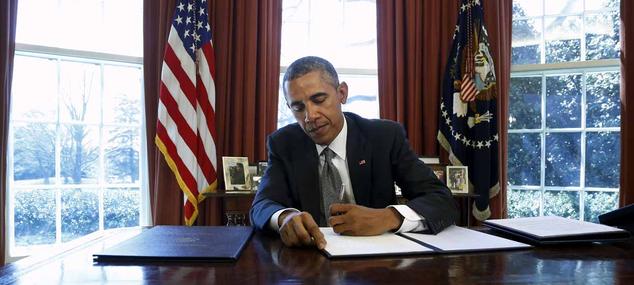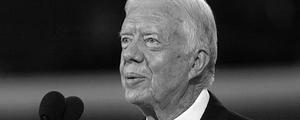Story Highlights
- All major economic leaders saw increase in Americans' confidence
- GOP congressional leadership saw biggest one-year gain
- One in four do not have opinion of Fed Chair Janet Yellen
WASHINGTON, D.C. -- Half of U.S. adults say they have "a great deal" or "a fair amount" of confidence in President Barack Obama "to do or to recommend the right thing for the economy," a significant rebound from last year's record-low 42%. Moreover, Obama continues to be the most trusted economic actor in Washington among several federal policymakers, including the Democratic leaders in Congress (44%), Federal Reserve Chair Janet Yellen (42%) and the Republican leaders in Congress (38%).
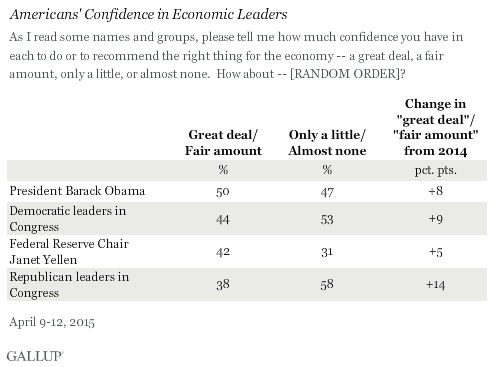
In Gallup's annual Economy and Personal Finance poll, confidence rose for all four leaders, or sets of leaders, compared with last year. This allowed Obama as well as congressional Democratic and Republican leaders to climb out of last year's ratings cellar. Undoubtedly, the general improvement in Americans' economic confidence compared with a year ago played a pivotal part in these more charitable reviews. Gallup's Economic Confidence Index averaged -3 in early April, compared with -16 at the same time in 2014. But even as their scores improved in 2015, none of the four types of leaders has surpassed their historical averages, excepting Yellen, who is in only the second year of her tenure.
While Americans give Obama the highest marks in doing right for the economy -- as is typical for the current president -- Republican congressional leadership has enjoyed the biggest upswing on this item, a yearly increase of 14 percentage points. Still, a decisive majority (58%) of Americans say they have only a little or almost no confidence in the GOP leadership to make the right decisions for the economy.
Self-identified Republicans were mostly responsible for the higher GOP ratings; their ratings of their party's congressional leadership climbed to 61%, an increase of 18 points. Confidence in GOP leaders also rose among independents and Democrats, but remains low.
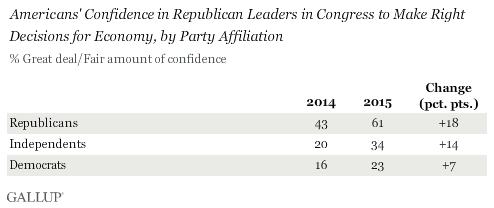
In terms of their public face, Republicans in Congress have largely the same leadership as last year -- John Boehner in the House and Mitch McConnell in the Senate. But these leaders have far more leverage over the nation's economic policy after last year's midterm elections, which saw the GOP not only retain control of the House but also take the reins of the Senate. This enhanced role on Capitol Hill may have played a part in Americans', and particularly Republicans', increasing confidence in GOP leadership on the economy, though other evidence suggests the new party in power has had little impact on how the nation views Congress. This month, Congress' job rating stubbornly sits at 15%, essentially unmoved from the historic lows of the last Congress. Previous congressional power shifts, such as in 2007 when Democrats took control, also saw larger gains on this measure (nine points) for that party compared with the year before.
Nonetheless, while Americans' level of confidence in Republican legislative leaders on the economy has improved, it is slightly below Republicans' 15-year average rating (45%) and is even further behind the stronger measures of confidence Republican congressional leaders received for much of the 2003-2006 period, the last time the party had control of both houses of Congress.
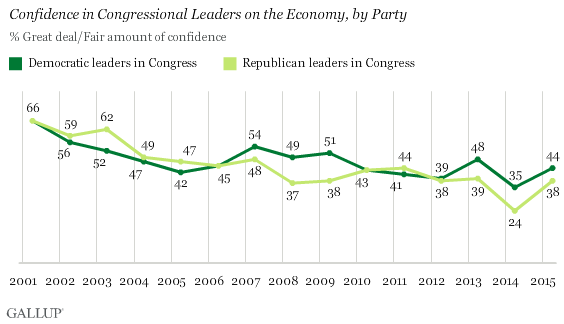
By contrast, Americans' confidence in Democratic congressional leaders is back near its historical mean of 47% after sinking in 2014. But because of the greater year-to-year increase Republicans enjoyed, Democrats' net advantage on this measure has narrowed to six points from last year's 11.
Though Influential, Janet Yellen Remains Unknown to Many
Probably the single biggest policy action that will have an immediate economic impact is in the authority of Federal Reserve Chair Janet Yellen -- entirely out of Congress' or Obama's hands. Yellen's likely action to begin raising short-term U.S. interest rates this year may be tantalizing for financial and economic professionals, but for a significant portion of the country (27%), Yellen is too unknown for them to offer an opinion on her performance. Notably, more U.S. adults have at least a fair amount of confidence in her economic recommendations (42%) than those who think otherwise (31%). But she, like her direct predecessor Ben Bernanke, has yet to inspire the same breadth of confidence as the venerated Alan Greenspan, who, in his last year in the position in 2005, generated a 56% confidence score.
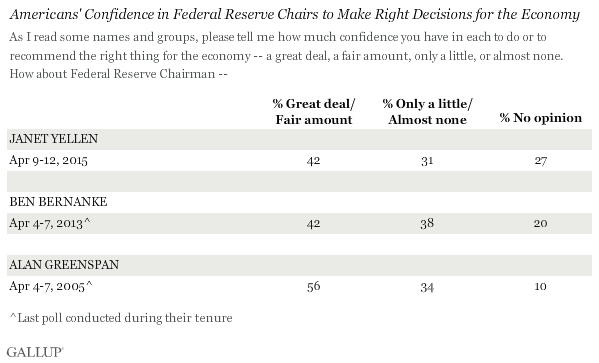
Despite the apolitical, technocratic nature of the Federal Reserve chair position, Democrats are nearly twice as likely (57%) as Republicans (31%) to express at least a fair amount of confidence in the Obama-appointed Yellen to recommend the right thing for the economy. About a quarter of each party group has no opinion.
Bottom Line
Compared with last year, critical economic metrics such as Gallup's Economic Confidence Index have notably improved, and in tandem, so has the confidence Americans have in the nation's key economic decision-makers, including Obama, congressional leaders of both parties and Yellen. However, Americans' confidence in these leaders can hardly be described as bullish; instead, it is simply more in line with past levels.
Survey Methods
Results for this Gallup poll are based on telephone interviews conducted April 9-12, 2015, on the Gallup U.S. Daily survey, with a random sample of 1,015 adults, aged 18 and older, living in all 50 U.S. states and the District of Columbia. For results based on the total sample of national adults, the margin of sampling error is ±4 percentage points at the 95% confidence level. All reported margins of sampling error include computed design effects for weighting.
Each sample of national adults includes a minimum quota of 50% cellphone respondents and 50% landline respondents, with additional minimum quotas by time zone within region. Landline and cellular telephone numbers are selected using random-digit-dial methods.
View survey methodology, complete question responses, and trends.
Learn more about how Gallup Poll Social Series works.
